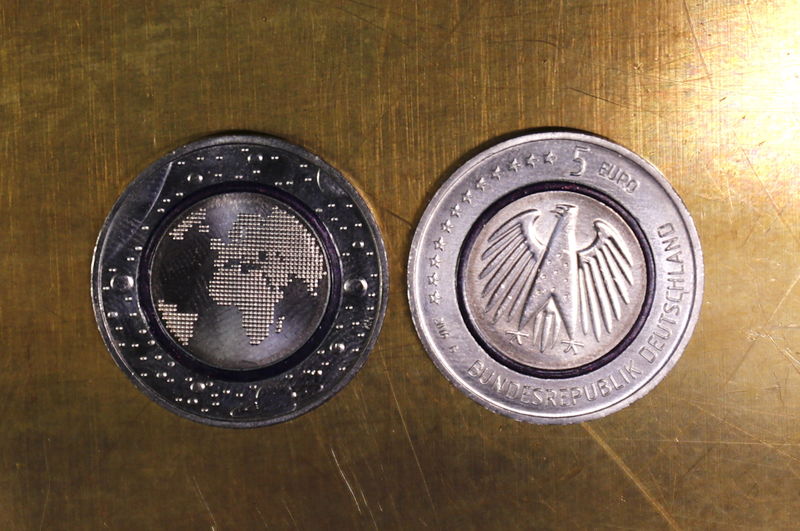By Dhara Ranasinghe
LONDON (Reuters) - Germany on Wednesday became the second G7 nation after Japan to issue 10-year bonds with a negative yield, highlighting a willingness among investors to hold top-rated debt even as yields across the world collapse.
Germany's 10-year government bond yield turned negative for the first time at an auction, fetching the lowest average yield on record for such paper at -0.05 percent.
Ten-year yields in Germany - the euro zone's benchmark issuer - have been trading below zero percent in the secondary market for the past three weeks and hit a record low last week at around minus 0.20 percent.
The negative yield at Wednesday's auction means investors buying the 10-year Bund and holding it to maturity would receive back less than they paid. That's a trade-off many investors are willing to make to hold safe-haven German paper against the backdrop of global uncertainty, unprecedented monetary stimulus from the European Central Bank and a tepid inflation outlook.
"This auction is a symptom of what we're seeing globally," said Orlando Green, European fixed income strategist at Credit Agricole (PA:CAGR). "We are in a positive market environment for bonds right now and investors remain relatively long German Bunds."
The coupon on the new German bond was zero percent for the first time, indicating investors are willing to miss out on annual interest payments to hold German bonds, considered one of the safest assets in the world.
A collapse in developed market borrowing costs has swept more than $11 trillion worth of bonds globally into negative territory, a move that has gathered pace since last month's decision by British voters to back leaving the European Union.
"It would be the icing on the cake for investors who have come to accept that you don't get money back on your investment," said David Schnautz, an interest rate strategist at Commerzbank (DE:CBKG), referring to a negative yield at the German auction.
NEW ERA
Japan auctioned a 10-year bond with a negative yield in March.
Switzerland, where almost the entire yield curve is sub-zero, issued a 10-year bond with a negative yield in April. On Wednesday, the country sold bonds maturing in 2058 with a yield of minus 0.023 percent.
German 10-year bond yields fell 4 basis point to minus 0.14 percent <DE10YT=TWEB>, as the implications of Brexit remain uncertain and central banks are expected to limit any fallout on economic growth by delivering monetary stimulus.
Many analysts expect the Bank of England, for instance, to cut interest rates when it meets on Thursday.
In addition, other political risks facing the euro zone mean safe-haven German debt are unlikely to lose their appeal for some time, analysts said.
Easing concerns about the risks facing its struggling banking system helped Italy to raise the top amount planned at bond auction on Wednesday.
Italy sold four bonds for a total of 7.5 billion euros ($8.3 billion), some at record-low yields, while Portugal auctioned about 1.16 billion euros of 10 and six-year bonds.
For Reuters new Live Markets blog on European and UK stock markets see reuters://realtime/verb=Open/url=http://emea1.apps.cp.extranet.thomsonreuters.biz/cms/?pageId=livemarkets
